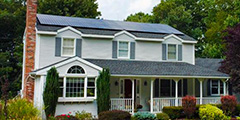EnergySage
Smarter energy decisions

The decision to buy or lease your solar energy system depends on your reasons for going solar. If you are interested in maximizing the financial returns of your solar energy system, buying the system is probably a better decision for you. However, if you prioritize an easy, maintenance-free way to reduce your energy bills and help the environment, you should consider a solar lease.
Solar loans and solar leases each have advantages and disadvantages. Both options reduce your monthly electricity bills and your impact on the environment, but the terms and conditions of each type of agreement are different. Compare solar loans and solar leases on EnergySage to determine which one is right for you.
The primary difference between secured and unsecured solar loans is that secured solar loans require that you promise an asset, usually your home, as collateral for the money that you borrow. Unsecured solar loans do not, but their interest rates are generally higher to compensate for the increased risk taken on by the lender. To understand which financing option is best for you, evaluate offers for both secured and unsecured loans on EnergySage.
Many different institutions offer solar loans, including local and national banks, specialty financing companies, manufacturers, and credit unions. To choose the best solar loan for you, compare options from a few different financing providers. Use the EnergySage Solar Marketplace to review multiple equipment, installer, and financing options.
Many installers provide loans, but not all installers. These are often unsecured solar loans, which may have hidden fees but other benefits relative to secured solar loans. While installers are often dealers for loans, they’re not necessarily the lender themselves. By signing up for a solar loan through an installer, you may be borrowing from a separate loan company that works with the installer. It’s important to consider the terms and conditions of your agreement with the lender as well your agreement with the installer.